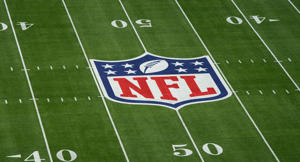
© Provided by The Comeback The NFL logo ahead of Super Bowl LVII.
The NFL’s gambling policy has received a lot of attention lately, with several players receiving six-game suspensions for violations of it. That’s prompted discussion of the policy from coaches, players, and media members. And a particularly interesting twist there came from Pro Football Talk’s Mike Florio, who asked the NFL this weekend if the policy applied to players not under contract, and got a response from league spokesperson Brian McCarthy suggesting it did:
Here’s more on that from Florio’s piece:
“The policy applies to NFL Players, which the union defines as players that are under an NFL Player contract or are seeking employment as an NFL Player (i.e., have signed a contract in the past and are currently trying to find a new contract or are undrafted free agents who go to a tryout),” Chief NFL Spokesman Brian McCarthy said via email.
The gambling policy doesn’t put it that way, and it definitely doesn’t incorporate by reference the union’s definition of player.
The gambling policy expressly applies to “NFL Personnel.” That term is defined by the gambling policy as follows: “Unless otherwise limited, this Policy applies to all full-time and part-time personnel including League office employees, club employees, players, owners, coaches, athletic trainers, game officials, security personnel, game-day stadium personnel and other staff, consultants, and temporary contract workers.”
That definition implies that the personnel are currently, not formerly or potentially, employed by the league and its teams.
Also, there’s nothing in the gambling policy that expressly incorporates anything from the Collective Bargaining Agreement.
Of course, this would not be the first NFL rule applying to people not actually in the NFL. The league specifically does that with its rules on who is eligible for its draft (players out of high school for at least three years who have used up their college eligibility, or who have been given NFL approval to enter the draft “early”); that’s led to some people looking to play professional football going to other leagues with less-stringent age requirements first, and being eligible for the NFL Draft while playing elsewhere.
And in an even more analogous situation, the NFL has punished players for “missed” drug tests while they’ve been in other leagues. That’s led to players being put in higher stages of the NFL drug program when they returned to that league (although the NFL eventually sort of reversed course there). That appears to be based on that “are seeking employment as an NFL player” rationale McCarthy mentions. And, as Florio notes, that only comes from the CBA preamble, and is rather vague about exactly what counts as “currently trying to find a new contract.”
The NFL gambling policy has proven challenging to follow for even many already in the league. Consider what anonymous players told Kalyn Kahler at The Athletic earlier this month on how they weren’t informed of the details of the policy (which includes allowing bets on other sports, but not while at team facilities, including planes and hotels). One player had a particularly harsh comment on the lack of education he had received on the specifics of the anti-gambling rules:
“That’s bogus because straight up, that’s not talked about like that. That could have been any one of us. They might have talked about it for a brief second, but do you know the player was present at the time you guys talked about that? ‘Oh, well it’s in the handbook.’ So you’re gonna tell a player to read 1,000 pages of nonsense and to recall everything? … You could make the argument for everybody, because people are betting during rivalry week — Florida is playing Florida State, Ohio State vs. Michigan — everyone is betting on that. Could all those guys get in trouble?”
According to the NFL, it sure sounds like they all could. And it sure sounds like people not even currently in the NFL could get in trouble under its policies as well. It will be interesting to see if that comes up, and if players who sign with NFL teams wind up being punished for past gambling activities while they weren’t under contract.
[Pro Football Talk; NFL logo photo from this year’s Super Bowl, from Kirby Lee/USA Today Sports]
The post NFL suggests gambling policy applies to players not in the league appeared first on The Comeback: Today’s Top Sports Stories & Reactions.